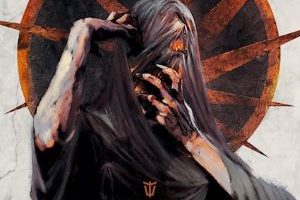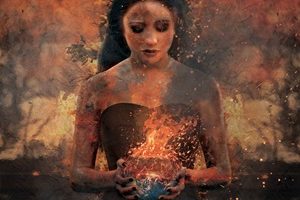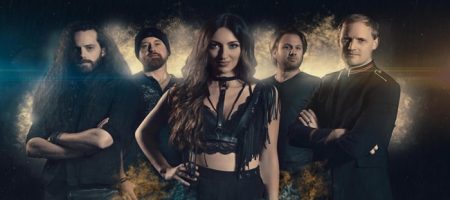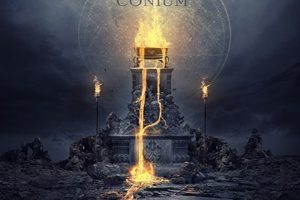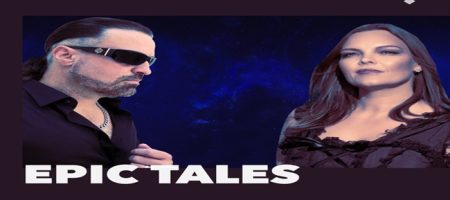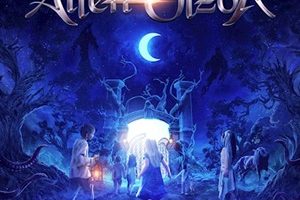Deep Sun – Living in a Dreamland
Sunday, 26th June 2022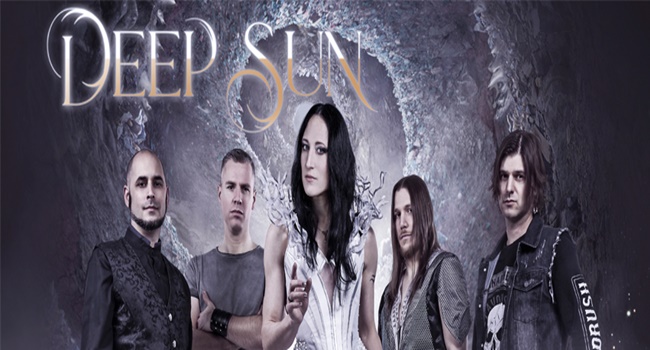
Focusing on an album of dream stories that are literal as well as allegorical and symbolic in sensibility, Swiss act Deep Sun embrace a love of symphonic metal/rock for this third album Dreamland – Behind the Shades. Painting broader strokes through the skillsets and pull of influences past and present, this quintet wishes to take their style to audiences far and wide – those who appreciate melodies and hooks as much as bombastic and semi-operatic leanings.
We reached out to four/fifths of the band to answer everything from childhood memories, new album thoughts, opinions on symphonic metal, the democratic process when it comes to band decisions and outlook, plus hopeful touring plans into next year with vocalist Debora Lavagnolo, bassist Angelo Salerno, keyboardist Tom Hiebaum, and drummer Tobias Brutschi.
Dead Rhetoric: What can you tell us in regard to your first musical memories growing up in childhood? How did you make the transition into heavier forms of music, and eventually wanting to pick up an instrument to perform in bands?
Debora: I have been in contact with music since childhood. Through my parents I heard a lot of Uriah Heep, Pink Floyd, Deep Purple, but also ABBA, Kate Bush, etc.
Music has always fascinated me in particular. So, I was also in a youth choir and have had various singing teachers. Until I heard Nightwish and Tarja Turunen for the first time. Then I knew where I wanted to go with my voice. I took classical singing lessons and studied at the music conservatory in Zurich.
Angelo: I have been connected to music and instruments since my early childhood. Whenever I watched live music as a boy, I was mesmerized and watched the musicians playing their instruments. In my youth, other instruments such as bass and guitar were added. Bands like Led Zeppelin, Jethro Tull, Tool, Nightwish, Moonsorrow and also old historical music shaped my development.
Tom: I was a very musical boy and was enthusiastic, whenever I saw musicians or heard some music.
My first contact with “heavier” music was, when a friend of mine showed me some skater punk like Sum 41. Soon after that I discovered bands like Nightwish, Stratovatius, Sonata Arctica, Hammerfall, etc.
Dead Rhetoric: Dreamland – Behind the Shades is the third and latest album for Deep Sun. Outside of gaining a new guitarist with Stephan Riner, where do you see the major differences in terms of the songwriting, recording sessions, and performances/ approach this time around compared to your latest effort Das Erbe der Welt from 2019?
Tobias: With Frank Pitters from Silverline Music we were able to get a very experienced and successful producer for the new album. This also changed the pre-production process. We spent almost two years discussing our song proposals with Frank and reworking them so many times until we were all convinced with every single song. Frank just knew how to get out of our music what it needed.
Debora: Our songwriting has become more and more optimized over the last few years. In the beginning we all sat in the rehearsal room without any ideas and played until someone had a flash of inspiration, then we went over to a software called Tuxguitar, where you could rather awkwardly enter notations on the PC keyboard, until we started to record the songs directly at home. Everybody plays their track and records it directly. So, I can also sing suggestions for backing vocals to the lead vocals and make them available to everyone. During the songwriting process, you get a good feeling for what the song needs or doesn’t need. It was also an optimal approach for us in terms of working with our producer Frank, which was very digital due to the local separation of almost 1000 kilometers in pre-production.
Tom: On all our “older” songs there was the music first and then came the lyrics. This time we changed that process in a few songs which was also very inspiring for the songwriting.
Dead Rhetoric: You shot official videos for “Dreammaster” and “Killer in a Dream” – the first a performance-oriented clip, where the second showcases some narrative/acting sequences in a casino environment around the band performance. Tell us about the choices surrounding which singles to showcase from the album, and how you felt the video treatments/shoots went? Do you believe it’s very important to present the band in this visual medium for a promotional tool on social media platforms to gain more of a foothold with your music?
Debora: We chose “Dreammaster” as the first song because this song is the most symphonic song on the album and represents the whole message of the album as well as the new path, we have taken the best.
After that came “Living the Dream” as a lyric video with a strong message: live your dream and don’t dream your life away. This is exactly what we are currently doing with our musical journey – and we love it!
“Killer in a Dream” is a very special song where Tom was able to realize a long-held dream of writing his own James Bond song. It also shows our musical development in songwriting as well as singing. A really high quality song. And I worked on this text for a very long time and went over it and the whole theme again and again during my joggings. (laughs)
The reactions to the videos clearly show that there is still a need for visual realization of songs. Especially for “Killer in a Dream” there was a lot of positive feedback because we told an extensive and cool story.
Tobias: These three songs could not be more different musically and lyrically and thus show the diversity of our songwriting as well as the use of the album theme: dreams in all its facets.
For “Killer in a Dream” we also had the unique opportunity to shoot in the largest casino in Switzerland. For the wonderfully and elaborately designed video, we were able to work with MWFilms, who did a great job.
But we don’t just make videos for promotional purposes. We make videos for us, because it’s fun for us, because it’s fun for the fans and because it’s just part of our life. Of course, today’s social media platforms make it easier to get music and videos out into the world, but the flood of new music is immense, which in turn makes it harder to be seen and heard.
Dead Rhetoric: What was it like working with Austrian producer Frank Pitters, who has worked in the past with acts like Edenbridge and Visions of Atlantis among others? What details or insights did he capture that you believe made the final product much stronger in the end?
Tobias: We started looking for a producer for our new album a few years ago and found a master of his craft and also a true friend. Frank Pitters is an incredibly talented producer, a man who knows his craft like no other. The collaboration with him was extremely good and friendly from the beginning. He pushed every single member of the band to achieve their best, to develop themselves further and he did the band a lot of good in all aspects. The Deep Sun songs are much more tidy and structured, without losing the symphonic metal style.
Angelo: He is a master in his field. There is no other way to put it. His compositional skills, which have helped our songs become what they are now, are remarkable. Despite everything, he is always open to constructive input and criticism. This is not a matter of course for a producer.
Dead Rhetoric: How would you describe Deep Sun when it comes to playing live versus what people hear from the band on your records? What do you try to get across to the audiences that you perform for, and what have been some of the more memorable shows/festival appearances the band has done so far?
Tobias: Deep Sun is definitely a live band and offer the audience an energetic show. No matter if there are 1000 people or 2 people. We always give full speed. We have always managed our music without any samples, so everything you hear on stage comes directly live from the stage. That has always been important to us. Of course, we don’t exclude that we will ever use samples, as it is common in the symphonic metal scene, but at least it is not like that at the moment.
Debora: I love working both in the studio and on stage. In the studio it’s all about conveying the feelings of the song and on stage it’s all about pure energy! The energy that can happen between the band and the audience is indescribable and I love that. Our song “Euphoria” is also about exactly this feeling. And I always give 100%, no matter what I do.
Dead Rhetoric: You’ve now been on Massacre Records for a couple of albums. How do you feel about the label, their staff, and their commitment to the band? Do you believe they are supportive and understanding of what you want to achieve with Deep Sun long-term?
Tobias : Yes, this is the second album we are releasing with Massacre Records. We experience Massacre Records as a good ally, as a strong partner on our side. We are happy to have a record label that understands the craft.
Dead Rhetoric: What first attracted you to the symphonic metal genre? What qualities do you enjoy most regarding this style, and what are some of your favorite releases that you use as inspiration or a benchmark for what you’d like to achieve with Deep Sun?
Debora: Symphonic and power metal are the two genres that fascinate me the most. Because of the diversity, because of the mood, because of the power, because of the epicness. Symphonic and power metal is freedom and life for me and gives me infinite strength. Both when I listen to it and when I perform it myself. When I heard Nightwish with Tarja and the album Once for the first time, or Within Temptation with The Silent Force, I was blown away. My heart just goes out to them.
Angelo: I’m interested in different metal genres. Starting with heavy metal, through pagan metal to power and symphonic metal. All of them have a certain magic that grips, energizes and inspires me. I can’t say what it is in detail, it’s the result of its effect on me. The same is with Deep Sun… everything can, nothing has to… that’s what I call artistic freedom.
Dead Rhetoric: I would imagine that you still have to balance careers outside of music to make a living when it comes to the musical output for Deep Sun. How do the members navigate these challenges of devoting proper time and energy to both – while still maintaining a personal life with family, friends, relationships, etc.? Do you have the proper support and encouragement from those outside people when it comes to your musical endeavors?
Tobias: This is definitely a big issue at Deep Sun as well. Without the support of the family, such an effort would not be possible.
Deep Sun is a democratically run band without an actual band leader. So we can distribute the tasks among ourselves very well. Everyone does what they do best and, above all, all decisions are made together. I am convinced that this is the recipe for success for a functioning band community. But it’s clear that the effort required to run a band today is comparable to that of a small business. It takes an enormous amount of time, especially the administrative matters, which unfortunately are less fun than making music itself. For almost a year now, I have been taking care of the management of the band on a part-time basis with my small company Artist-Management.
Debora: We are not only band members, but we see ourselves as a small family. And so we support each other where we can. And with good planning and consideration, we reconcile both music and our jobs and families.
Angelo: The whole thing is really a balancing act, but it can be planned and implemented. The solidarity among each other supports us in the implementation.
Dead Rhetoric: How would you describe the personalities of each member of Deep Sun – as well as special qualities or things they contribute to make the output of the band special? Do you maintain solid friendships outside of the band activities as well?
Debora : As I said, we see ourselves as a family. And so we also do a lot in private, like our annual band event, go to concerts together, have barbecues in the summer, and so on.
Tobias: Each band member has their own personality and together it harmonizes excellently. We have all known each other for many years now and we feel very close to each other. That is a beautiful gift.
Dead Rhetoric: What do you see as the biggest factors for Deep Sun gaining more of a following and foothold in the metal scene – beyond your home country of Switzerland and the European continent into international territories?
Tobias: We want to make the music we like and we want to be on stage, in Switzerland and of course abroad. But it has to stay within a healthy limit. We can’t go on tour for weeks and travel around the world, that would be very difficult because of our jobs. Basically, we are very happy with our fans and especially with the many positive feedbacks we receive every day from all over the world.
Dead Rhetoric: What hobbies, interests and/or passions do the members of Deep Sun like to pursue away from music when you have the free time and energy to do so?
Tobias: That is very different. Debora and I do a lot of sports besides music. Debora is a former Swiss track and field champion over 100, 200 and 400 meters and now concentrates on the long running distances. I myself do cycling races and together we do a competition together as a team every now and then.
Debora: Yes, I love running! While jogging, I can switch off and recharge my batteries. I also very often learn lyrics while jogging. And I never listen to music while jogging, because I always want to be in the here and now and practice mindfulness. For me, jogging is also a kind of meditation.
Angelo: My spectrum is very broad. While composing and making music gives me a lot of soul food, there is also practical astronomy, challenging board games and my books. Expanding and experimenting with recordings and sound engineering with Cubase is the somewhat more nerve-wracking part… But it’s worth it…
Dead Rhetoric: What is the worst advice you see or hear being dispensed in the metal music industry?
Tobias: The drums were too loud.
Angelo: “Specialists” who mean what you do or don’t do in metal… With reference to slapping with the bass in the metal genre…
Tom: Any criticism that isn’t constructive such as “I don’t like symphonic metal”.
Dead Rhetoric: How do you see the next year or so shaping up for Deep Sun in terms of live shows, festival appearances, touring, etc.? Are there other projects or band releases from the members that we can look forward to – and has work begun on the next record behind the scenes? If so, how do you see that material taking shape?
Tobias: From now until 2023, it will definitely be a great time for Deep Sun. We still have some great shows coming up in 2022 and we already have commitments for bigger festivals abroad for 2023. The concert planning for 2023 has only just begun, but we are sure that we will be going abroad more often.
And yes, we still have a little musical surprise up our sleeve. Something unprecedented. But we’re not giving anything away yet. You can look forward to spring 2023!
Tom: I’m actually in a new album production with my other band Green Labyrinth.
Debora: Besides Deep Sun I am also on the road as a singer for weddings, parties, events, and so on. There are no releases here, but you can book me as a singer for your event.
https://www.youtube.com/watch?v=8WjcPH8uIaU
https://www.youtube.com/watch?v=oOJs_rwtRhY











